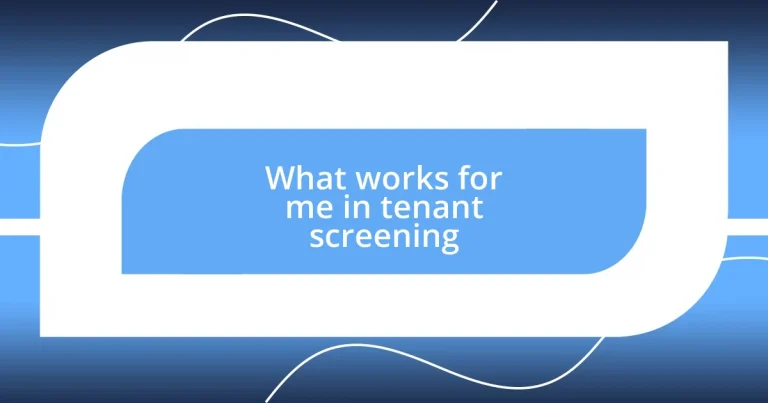Key takeaways:
- The significance of thorough tenant screening is emphasized as a means to identify responsible tenants who maintain property respect and foster positive landlord-tenant relationships.
- Defining clear criteria, such as stable income and reliable rental history, is crucial for saving time and avoiding potential issues with tenants.
- Engaging in direct communication with previous landlords provides valuable insights that go beyond application documents, aiding in making informed rental decisions.
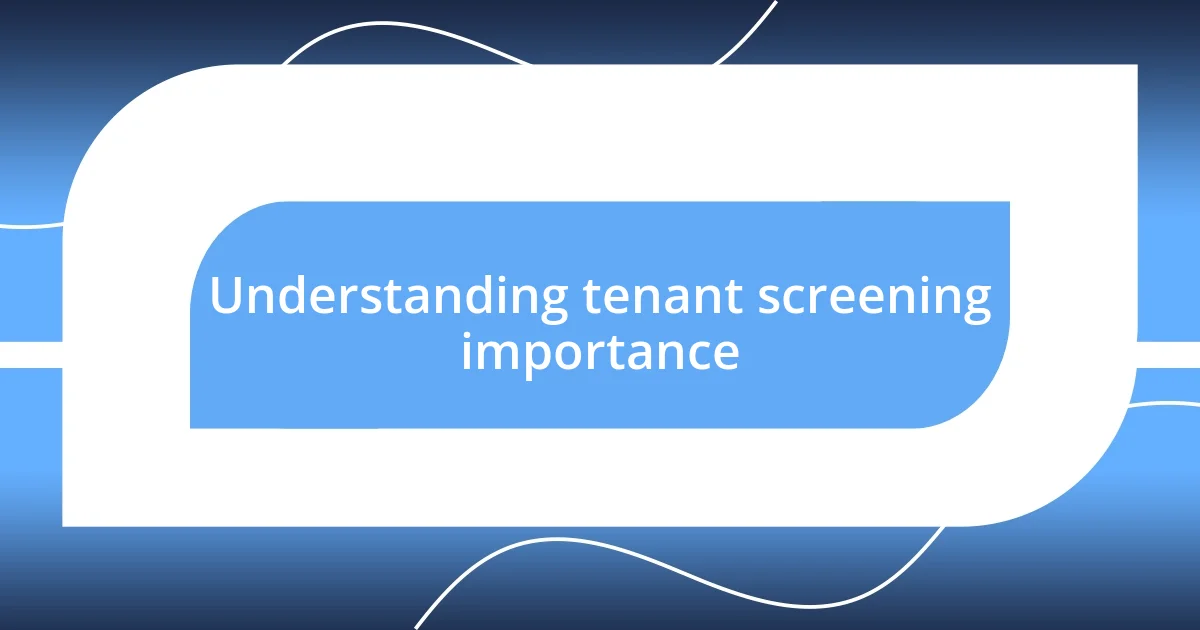
Understanding tenant screening importance
Tenant screening isn’t just a box to check; it’s a fundamental part of ensuring a successful rental experience. I remember the first time I skipped this step—what a mistake! I ended up with a tenant who not only paid late but also caused damage to my property. It was a costly lesson that made me realize the value of thorough screening.
When I think about the importance of tenant screening, I often wonder: how much risk are landlords willing to take? From my standpoint, it’s about more than just verifying income—it’s about understanding who will live in your space. Screening helps to identify tenants who respect property, pay rent on time, and maintain a positive landlord-tenant relationship, which ultimately leads to peace of mind for everyone involved.
Every experience has taught me a valuable lesson, and in the realm of tenant screening, those lessons often come with emotional weight. A good tenant isn’t simply a dollar sign; they can be a friend or a vital part of your investment story. Imagine the satisfaction of having a responsible person in your property—wouldn’t that make your life easier and more rewarding? It’s these connections that make effective tenant screening so crucial.
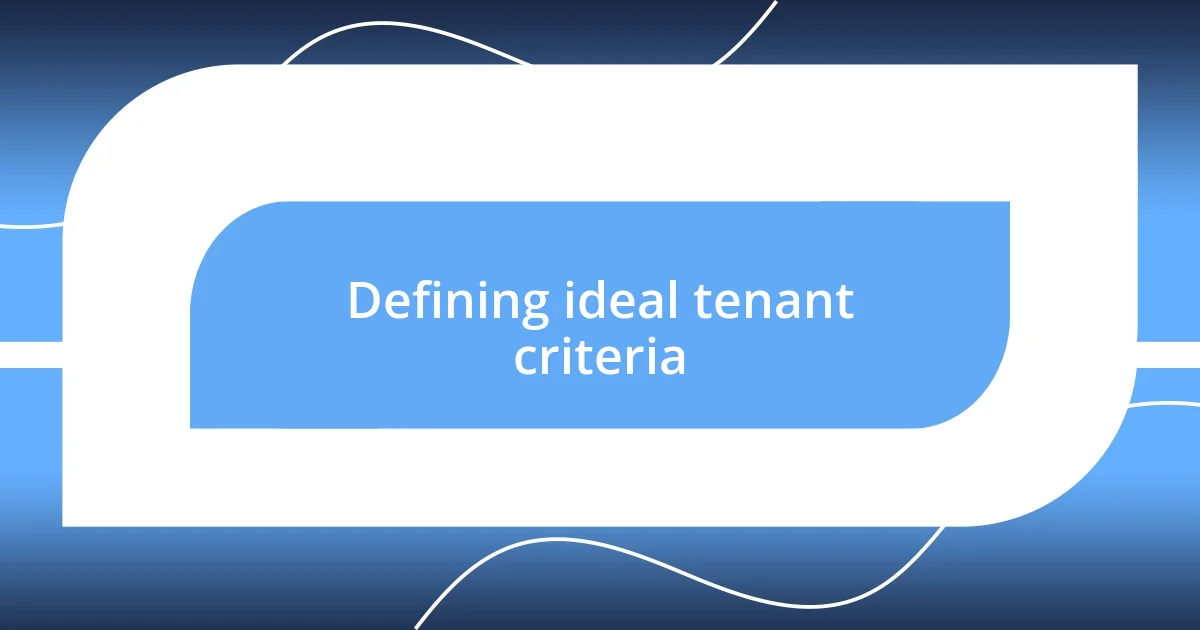
Defining ideal tenant criteria
Defining the ideal tenant criteria is a critical step in the screening process. I’ve learned the hard way that having specific standards can save an immense amount of time and stress down the line. For instance, when I first started renting, I didn’t have a clear picture of what I wanted. I ended up with a tenant who had great references but was always late with payments—an experience that reshaped my understanding of tenant criteria.
Here’s what I consider essential in my ideal tenant profile:
- Stable Income: A good rule of thumb is that tenants should earn at least three times the rent. This has helped me avoid financial strain and worry.
- Rental History: I look for a minimum of two years of stable rental history. This gives me confidence they’ll respect my property.
- Background Check: I conduct a thorough background check for any criminal history that might raise red flags.
- Credit Score: A decent score shows responsibility and the likelihood of timely rent payments.
- Good References: Personal recommendations from previous landlords are invaluable and can provide insights that documents can’t.
These criteria not only protect my investment but also create a smoother landlord-tenant relationship. Over time, I’ve seen how defining these qualities results in finding tenants who treat my property with care and respect.
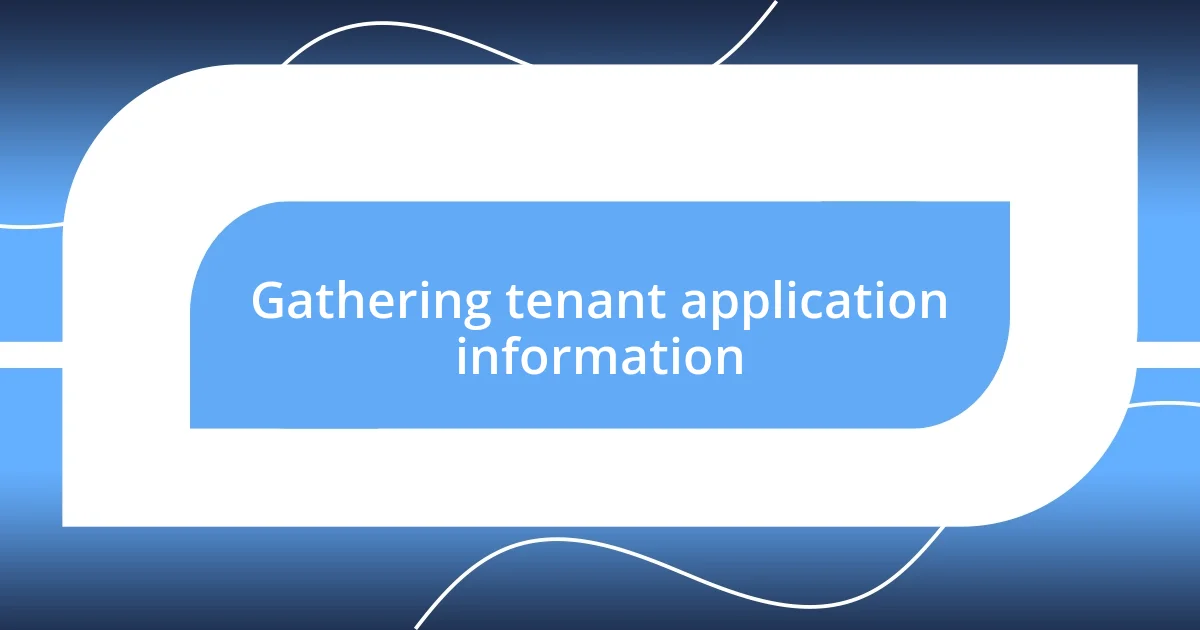
Gathering tenant application information
Gathering comprehensive tenant application information is crucial for informed decision-making. I always make it a point to request the full application, which includes employment details, past rental history, and personal references. Not long ago, I had a prospective tenant who seemed perfect at first glance. However, upon checking their application thoroughly, I found gaps in their rental history that raised concerns and led me to choose someone else. This experience reinforced my belief in the importance of gathering every piece of necessary information.
While many landlords may rely solely on the application form, I prefer to dig deeper by conducting phone interviews with applicants. I remember one applicant who had great references on paper, but during our call, their demeanor and communication skills gave me pause. This small step of personal interaction not only uncovers more about a tenant’s character but also allows me to gauge their reliability. It’s these subtle clues that often lead me to a better choice.
When soliciting application information, I also encourage prospective tenants to provide additional documents, like recent pay stubs or bank statements. This practice has often led me to unexpected insights—like when I discovered an applicant was self-employed and had fluctuating income, which shifted my perception of their financial stability. Ultimately, gathering comprehensive information isn’t just about filling out forms; it’s about crafting a narrative that helps you make more informed choices about who you invite into your property.
| Information Required | Purpose |
|---|---|
| Employment Details | Verify stable income and employment history |
| Rental History | Assess reliability and past landlord interactions |
| Personal References | Gain insights into tenant’s character |
| Financial Documents | Evaluate financial stability |
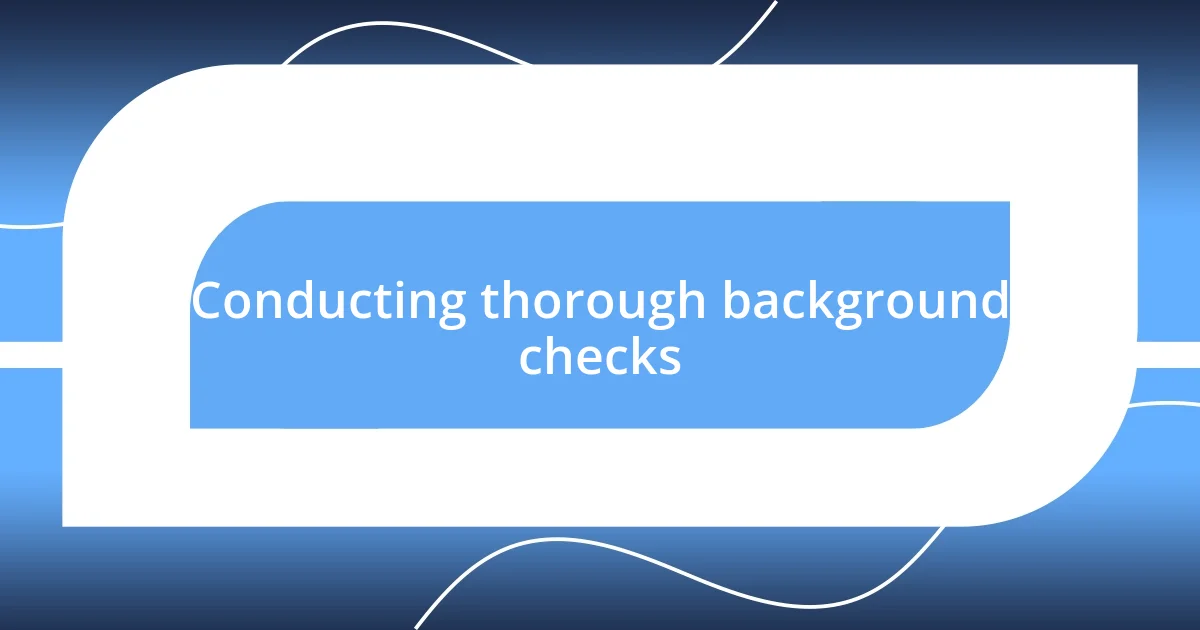
Conducting thorough background checks
Conducting thorough background checks can feel daunting, but I can’t stress enough how essential they are in the tenant screening process. When I started as a landlord, I overlooked this step, thinking that good references were enough. I once rented to someone who had a history of minor issues, only to discover later that those “minor” issues were part of a much larger pattern. This experience taught me that no detail should be considered too small; every bit of information contributes to the bigger picture of a tenant’s reliability.
I take a proactive approach by using reputable screening services that provide criminal background checks, credit history, and eviction records. These tools have become indispensable in my toolkit. I vividly recall a situation where I was about to approve an application from what seemed like a perfect tenant. After conducting a detailed background check, alarm bells went off when I found an eviction in their past. That single piece of information saved me potential headaches down the line. So, I always ask myself: what would I prefer—investing time in a thorough check now or dealing with problems later?
If you think about your own relationships, wouldn’t you want to know everything you can about someone before bringing them into your life? The same logic applies to finding tenants. I firmly believe that a thorough background check not only protects my property but also helps foster a positive landlord-tenant relationship. Transparency on both sides can lead to a smoother renting experience. Every time I conduct these checks, I feel reassured that I am making informed choices, paving the way for a construction of trust that is invaluable for all parties involved.
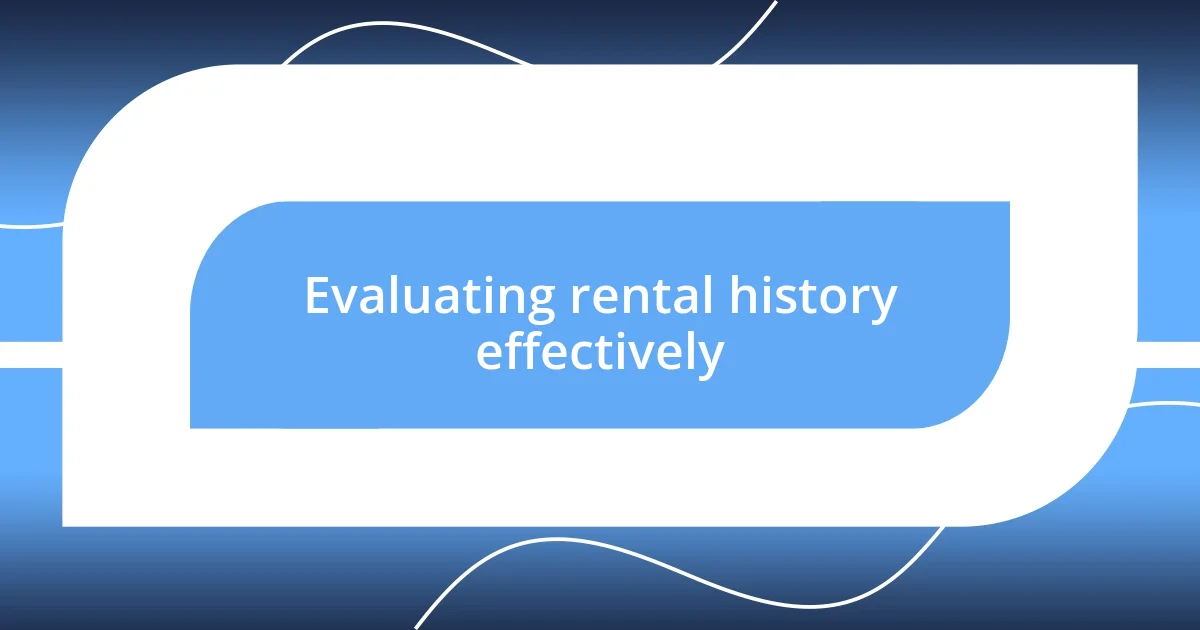
Evaluating rental history effectively
Evaluating a tenant’s rental history effectively can reveal volumes about their reliability. I recall one instance where an applicant had glowing references, but a closer look at their rental history showed frequent moves and a couple of late payments. This raised a crucial red flag for me—did they struggle to settle down? I believe understanding this aspect can really shape your expectations as a landlord.
Connecting with previous landlords has been an eye-opener as well. I often ask for direct communication with those who managed the tenant before. When I did this for one applicant, the former landlord shared anecdotes of consistent late rent and poor communication. This firsthand insight helped me avoid a potentially stressful situation. Have you ever thought about how much honesty can come from those who’ve worked directly with potential tenants?
I also look for patterns in rental history, like breaks in tenancies or any evictions, which can be telling. For example, I once overlooked a gap in an applicant’s history, only to find out later it was due to an eviction—something I wish I’d paid more attention to. Reflecting on past experiences really helps me assess what might work better in my tenant screenings. When evaluating rental histories, I’ve learned that every detail matters and shapes the narrative of who that person is as a potential tenant.
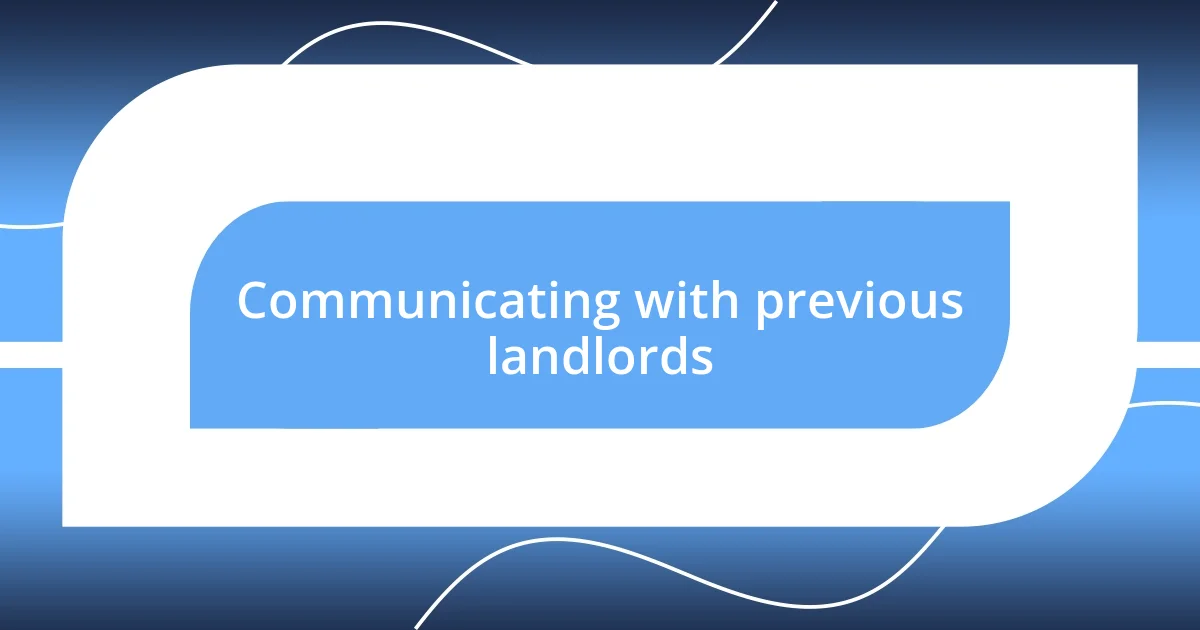
Communicating with previous landlords
Communicating with previous landlords can often shed light on a tenant’s true character. I remember reaching out to a former landlord who gave me a detailed account of an applicant’s behavior—how they kept the place tidy, paid rent consistently, but also had a habit of leaving maintenance requests lingering. That insight helped me set clear expectations and address my own concerns about long-term upkeep. Isn’t it fascinating how someone who has already been through the experience can provide insights that paperwork simply can’t?
I’ve also learned the value of direct communication over emails or text. One time, I decided to call a previous landlord instead of just sending out a message. The candidness of the conversation was refreshing! The landlord mentioned that while the tenant was generally good, there was an instance of creating noise complaints with neighbors. It got me thinking—how often do we miss out on important nuances just because we stick to formal communication? I find that picking up the phone can foster genuine dialogue, leading to better clarity about an applicant.
Moreover, I pay attention to the tone and enthusiasm (or lack thereof) of the previous landlord’s feedback. I once spoke to someone who seemed evasive when discussing a tenant; it raised a warning flag for me. It made me realize that the level of engagement from a former landlord can indicate much about the tenant they are describing. After all, a landlord willing to share both praise and constructive criticism often has the most to teach us about making the right choices. It’s all about piecing together the storytelling of past tenancies to inform my future decisions.
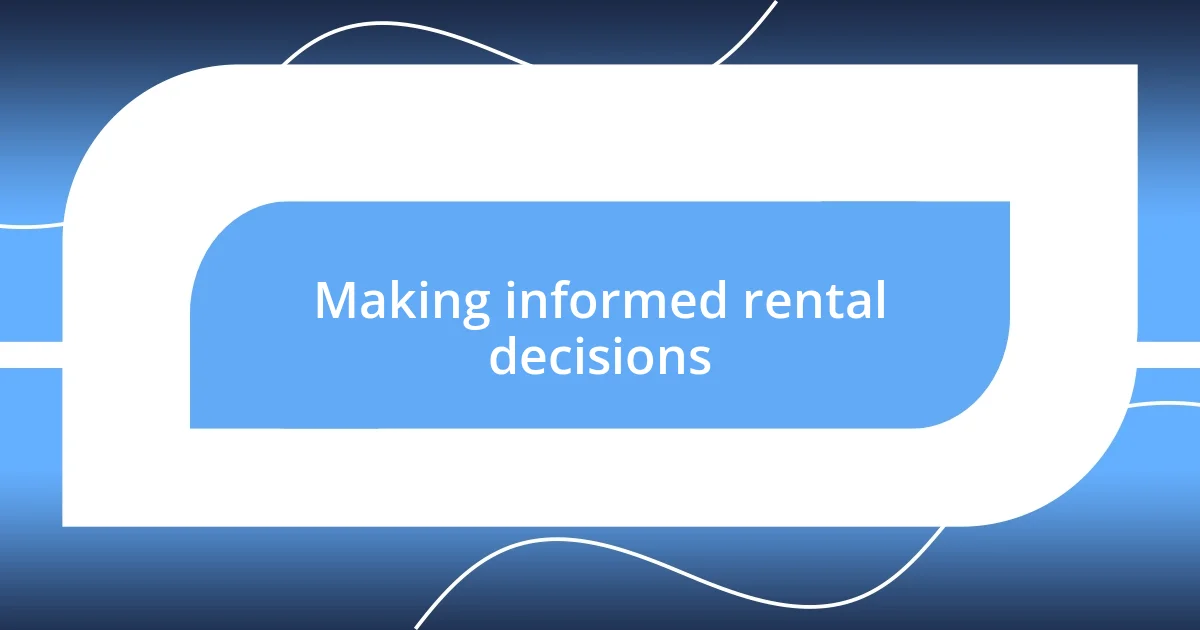
Making informed rental decisions
Making informed rental decisions involves sifting through various pieces of information to create a complete picture of a potential tenant. I remember a situation where I was torn between two applicants. One had a solid financial history, but their rental references were lukewarm at best, while another applicant had a slightly lower income but glowing reviews from past landlords. I ultimately chose the latter, and it turned out to be a rewarding decision. Have you ever had to weigh such contrasting aspects? It’s crucial to see beyond the numbers and really consider how every piece of data influences the larger narrative.
I often reflect on how the depth of a tenant’s background can reveal deeper insights. For instance, when I once analyzed credit scores, I discovered an otherwise promising applicant had a recent spike in debt—something that rang alarm bells. This made me take a step back and ponder: is the tenant’s financial stability truly as solid as it appears? I find that while credit checks provide essential information, they must be balanced with insights from other sources. Connecting those dots can make a significant difference in the rental experience.
Trusting my instincts also plays a major role in my decision-making. There was a time when an applicant seemed perfect on paper but gave off an indescribable vibe during the interview. I decided to pass, and later learned they had a tumultuous history with former landlords. It taught me that sometimes, gut feelings stem from a subconscious observation of subtle cues. Don’t you think it’s important to pay attention to those instincts? Making informed rental decisions goes beyond just data; it’s about understanding the nuances and narratives behind each applicant.












